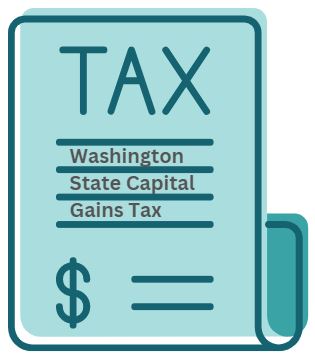Washington State Capital Gains Tax Highlights

February 27, 2023
Highlights:
- Washington State Capital Gains Tax effective 1/1/2022
- Taxes Long Term Capital Gains in excess of $250,000 at 7%
- Taxes will need to be paid by the tax filing deadline – April 2023
- Instructions on how to file your Capital Gains Tax Return
Background:
On April 25, 2021, the State of Washington passed the Engrossed Substitute Senate Bill 5096 (ESSB 5096). This imposed a tax on Washington state residents’ taxes annual long-term capital gains exceeding $250,000 at 7%. You will not be taxed if your gains are less, but anything over $250,000 will be taxed at 7%. There is no differentiation between being married or single.
The State of Washington requires individuals to submit their Federal Income Tax Return along with the Washington State Tax Return. For those individuals that file an extension, that alone does not alleviate filing a Washington State Tax Return. In addition, penalties and interest accrue from the due date.
What is the status of the law today?
Washington’s Supreme Court started hearing arguments on January 26th. We do not anticipate a ruling before the April tax date, meaning you must file your Capital Gains Tax Return if you qualify. Washington state was granted authority to administer and implement the tax. The State can collect the tax until the ruling is resolved and can begin collecting the tax in 2023. If the Court decides to strike down the ruling, any tax payments made will be refunded with interest. [i] As of today, there are two lawsuits filed against the constitutionality of this tax and law.
What constitutes capital gains?
The tax will apply to long-term gains on the sale or exchange of capital assets, stocks, and bonds[ii]. Your ordinary income, short-term capital gains, dividends, and interest are all excluded and will not be subject to the tax, as well as certain other exemptions[iii]. It is worth noting that the tax only applies to individuals and that “individuals can be liable for the tax because of their ownership interest in a pass-through or disregarded entity that sells or exchanges long-term capital assets. The tax only applies to gains allocated to Washington state.” [iv]
What about gifting?
As stated earlier, individuals and married couples are allowed a standard maximum deduction of $250,000. In addition to the standard deduction, a charitable donation deduction of $100,000 can be made for contributions to Washington-based non-profits.[v] [vi] For example, if you gifted $300,000 to Seattle Children’s Hospital, you would receive the standard deduction of $250,000, and you would be able to deduct an additional $50,000 for the charitable contribution. To maximize the deduction, you would have to gift $350,000 to a charity principally located or managed within the state of Washington.
What other exemptions are there to the tax?
Exemptions to the tax include but are not limited to[vii]:
- The sale or exchange of real estate.
- Investments made through retirement savings accounts include: 401Ks, Deferred Compensation Plans, IRAs, Roth IRAs, Employee defined contribution plans, employee-defined benefit plans, or any similar retirement savings accounts.
- The tax does not apply if the long-term capital gains are allocated to a location other than Washington state.
There are other exemptions to the Capital Gains Tax, but this is decided on a transactional basis. This tax also only applies to individuals and most likely will not affect business entities; however always seek the advice of a tax professional before taking any course of action.
What capital gains do I owe?
If you report[viii] as an individual or married couple with over $250,000 in long-term capital gains on your Federal Income Tax Return on Schedule D for this year, you will most likely owe the 7% Capital Gains Tax.
Questions to consider
- Were your long-term capital gains from selling intangible assets while Washington state was your permanent home at the time of sale?
- Did you report long-term capital gains from selling tangible property that was located in Washington when it was sold?
- Did you reside in the State for more than 183 days during the taxable year?
How do I report a capital gain from a sale?
You only need to file a Capital Gains Tax Return if you have made qualifying capital gains. When filing, you also must include a copy of your Federal Income Tax Return at the same time for the taxable year. Filing an extension does not extend the due date for paying the Capital Gains Tax. However, if your original capital gain occurred before January 1, 2022, you do not owe any Capital Gains Tax in the State of Washington.
How to file your Capital Gains Tax return
Washington State’s Department of Revenue online reporting system for the Capital Gains Tax is now live. If you meet the criteria for the tax, you must register using your Secure Access Washington (SAW) account. If you have not set up a SAW account, you must register for one, and here is the link.
Once you have a SAW account set up, there are two steps to filing. Below are links to videos that take you through how to complete the steps. Be sure to have a copy of your Federal Income Tax Return on hand to either attach digitally or mail a copy in after filing:
Conclusion:
Washington state is pushing forward with the tax. If the Supreme Court does not strike down the tax, the legislature is already sharpening the axe to tax even more. Recently the Seattle Times ran an op-ed about the potential for the tax to be raised to 8.5% and income gains lowered to $15,000[ix]. That is significant and could impact a large percentage of the workforce.
Emerald Advisors will continue to monitor the status of the legislation or any new legislation along with other states and keep you informed of any changes that will affect you and your families. So, this is what you need to remember:
- The tax is due to be collected in April 2023.
- Understand what your capital gains are and what exemptions you qualify for.
- If you qualify, sign up for a SAW account, register your Capital Gains account, and file your Capital Gains Tax Return with a copy of your Federal Income Tax Return.
Emerald Advisors is available for individual consultations to create tax planning strategies for your specific needs. However, Emerald is not a tax service, qualified CPA, or tax attorney, and any strategy implementation should also be reviewed by your tax professional to ensure accuracy. Therefore, please consult with a tax professional before completing any tax filing.
Disclosure: Emerald Advisors and its employees are not certified accountants, CPAs, or tax professionals. Emerald Advisors does not assume responsibility for tax estimates made with inaccurate information. Please consult with your tax advisor before taking action.
Emerald Advisors, LLC is a registered investment adviser. Information presented is for educational purposes only and does not intend to make an offer or solicitation for the sale or purchase of any specific securities, investments, or investment strategies. Investments involve risk and, unless otherwise stated, are not guaranteed. Be sure to first consult with a qualified financial adviser and/or tax professional before implementing any strategy discussed herein. Past performance is not indicative of future performance.
[i] (2022). Dor.wa.gov. Capital gains tax. [Online] Available at: Capital gains tax | Washington Department of Revenue
[ii] Ryan, M. (2022, July 2). Michaelryanmoney.com. Is There a 7% Washington State Capital Gains Tax? [Online] Available at: Is There A 7% Washington State Capital Gains Tax? | Michael Ryan Money
[iii] (2021, April 25). Lawfilesext.leg.wa.gov. Certification of Enrollment: Engrossed Substitute Senate Bill 5096. [Online] Available at: 5096-S.PL.pdf (wa.gov)
[iv] (2022). Dor.wa.gov. Capital gains tax. [Online] Available at: Capital gains tax | Washington Department of Revenue
[v] Alegre, J. & Haberzetle, J. (2021, May 13). Clarknumber.com. An Overview of Washington State’s Capital Gains Tax. [Online] Available at: An Overview of Washington State’s Capital Gains Tax – Clark Nuber PS
[vi] (2021, April 25). Lawfilesext.leg.wa.gov. Certification of Enrollment: Engrossed Substitute Senate Bill 5096. [Online] Available at: 5096-S.PL.pdf (wa.gov)
[vii] (2022). Dor.wa.gov. Capital gains tax. [Online] Available at: Capital gains tax | Washington Department of Revenue
[viii] (2022). Dor.wa.gov. Do you owe Capital Gains tax? [Online] Available at: Do you owe Capital Gains tax? | Washington Department of RevenueTa
[ix] Hathaway, C. & McIlwain, M. (2023, January 19). Seattletimes.com. An ‘excise tax’ on income is detrimental to WA’s future. [Online] Available at: An ‘excise tax’ on income is detrimental to WA’s future | The Seattle Times




